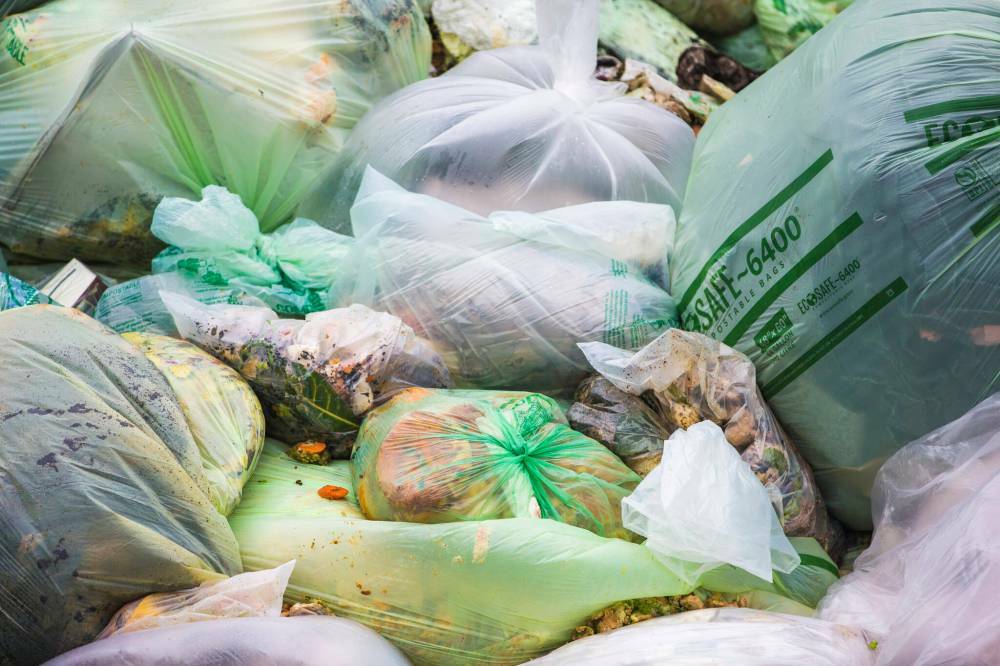The city is launching food waste depots to encourage composting and divert scraps from landfills ahead of a citywide program set for 2030.
Fifteen food waste drop-off stations will open at community centres and 4R depots to collect food scraps and other compostable material that will be picked up on a weekly basis and brought to the Prairie Green Landfill for processing and use as remediation material. The drop-off stations will open Oct. 15.
Compost Winnipeg is partnering with the city on the initiative and will oversee the maintenance of the bins.

The city is launching food waste depots to encourage composting and divert scraps from landfills ahead of a citywide program set for 2030. (Mikaela MacKenzie / Winnipeg Free Press)
“This is a great solution as a place to start, especially for educating Winnipeggers on how to compost and providing that service until we have a citywide program,” said sales and customer service lead Karrie Blackburn.
Compost Winnipeg currently provides waste collection services for residential and commercial businesses for a fee.
As part of the city program, food scraps, coffee grounds and filters, teabags, pet food and food-soiled paper products can be collected and stored in the fridge or freezer, then dropped off at one of the city bins for disposal.
Blackburn says the program is long overdue.
“We’re putting more things in the landfill than is necessary and they’re filling up faster, which means we have to expand them sooner, which is a cost to us as taxpayers,” she said. “We really need to be mindful of that bigger, long-term picture.”
The program comes after a two-year composting pilot project and ahead of the rollout of composting bins for all residents. The city will begin collecting a $9 fee per resident in 2025 to purchase the carts and deliver them to each household for the 2030 launch.
The community centre collection will run the city approximately $160,000 per year.
Coun. Evan Duncan remains cautiously optimistic of the program.
“It’s going to take a lot of public education, and it’s going to take buy-in,” Duncan said. “At first, I would anticipate it to be lower, but as it builds up over the coming years we can use some data to make some more informed decisions on how we move forward with our compost program.”
Data from the previous pilot, which ran from 2020 to 2022, suggests the new program will only see a 35 per cent participation rate when it launches, Duncan (Charleswood-Tuxedo-Westwood) said.
The councillor is weary the requirement to transport materials to a depot, rather than having the scraps picked up by the city could be seen as an inconvenience, while Blackburn is confident the program will be a success.
“We do need to start implementing changes to better look after our environment,” Blackburn said. “Our landfills are a significant emitter of greenhouse gasses, so obviously this isn’t a method that’s going to appeal to everyone, but those who have been very eagerly waiting for a citywide composting program are here for it.”
A 2023 public engagement survey on the city’s pilot project found 89 per cent of respondents supported the program and 80 per cent would use a citywide food waste collection program.
nicole.buffie@freepress.mb.ca

Nicole Buffie
Multimedia producer
Nicole Buffie is a multimedia producer who reports for the Free Press city desk. Born and bred in Winnipeg, Nicole graduated from Red River College’s Creative Communications program in 2020 and worked as a reporter throughout Manitoba before joining the Free Press newsroom in 2023. Read more about Nicole.
Every piece of reporting Nicole produces is reviewed by an editing team before it is posted online or published in print — part of the Free Press‘s tradition, since 1872, of producing reliable independent journalism. Read more about Free Press’s history and mandate, and learn how our newsroom operates.
Our newsroom depends on a growing audience of readers to power our journalism. If you are not a paid reader, please consider becoming a subscriber.
Our newsroom depends on its audience of readers to power our journalism. Thank you for your support.